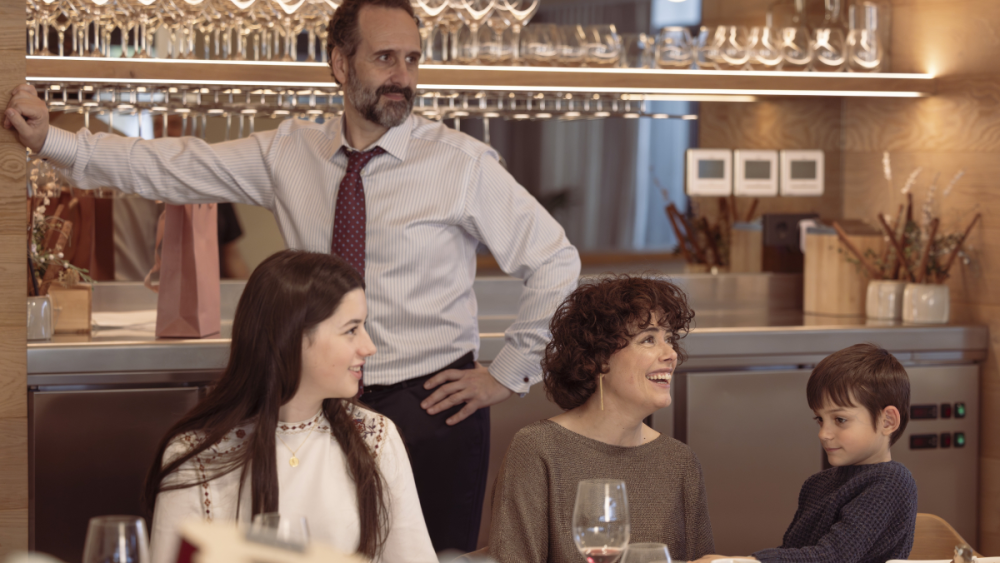
In 2022, Pedro Almodóvar hailed “Lullaby,” the feature debut of Basque director Alauda Ruiz de Azúa as “undoubtedly the best debut in Spanish cinema for years.” Her first series, “Querer,” acquired by Arte, won the top prize this year at Series Mania, the top TV festival in Europe.
Now, if the enthusiastic reaction of most Spanish reviewers is anything to go by, Ruiz de Azúa’s “Sundays” (“Los Domingos”) sees her make good on the promise detected by Almodóvar. With a days of main competition films still to play at San Sebastián, the family drama – which would also be a coming of age tale if that process were so truncated – sits top, head-and-shoulders among other competitors for San Sebastian’s Golden Shell on Basque newspaper El Diario Vasco’s critics’ poll.
The film’s title draws on an irony, Ruíz de Azúa said at a San Sebastián press conference. Sundays were supposed to be a time when a Spanish family comes together over lunch. In her film, Sundays show a family falling apart.
One underlying cause of contention is economic. Father Iñaki has drawn a bank loan against his mother’s flat to prop up his failing restaurant business. There is little sign that, if the family’s grandmother dies, Maite will get part of the inheritance.
The catalyst of building friction, however, is Iñaki’s eldest daughter Ainara who begins the film begging Maite to persuade Iñaki to let her go on a retreat organized by the local Betinas convent nuns, an enclosed order. “Why do you want to shut yourself up with a load of old women,” Iñaki asks.
It turns out the retreat is one step in a process of “discernment,” Ainara’s spiritual director, a dashing young priest explains to Iñaki and Maite, where Ainara will learn from God – with whom she already talks sometimes, she says – what He wants of her. Maite tries to talk Ainara out of making a decision so soon: She should choose the life she wants but not before living life, going to university, for instance, before choosing.
One question in the film is whether Ainara has been deeply wounded by the death of her mother, who was deeply religious, and the distance of her father, driving her to seek the warmth of another mother, Prioress Mother Isabel, and another father, the Father.
“I feel loved by Him,” Ainara insists. She doesn’t mention feeling being loved by her family. When she doesn’t back down, Maite takes more radical action.
“This is an austere, sober film. Textures, colors repeat in Ainara’s family home and the Betinas Convent. There are very few shots of the sky, Ruiz de Azúa noted at a “Sundays” press conference. “I wanted the two worlds, which could appear very different, to belong to the same world.”
“Sundays” is produced by Movistar Plus+, the biggest Spanish pay TV/SVOD operator, as well as Marisa Fernández Armenteros’ Buenapinta Media (“The Mole Agent”), Sandra Hermida at Colosé Producciones (“Society of the Snow”), Nahikari Ipiña at Sayaka Producciones, and Manu Calvo at Encanta Films (“Wounded”).The film is sold internationally by France’s Le Pacte, BTeam Pictures will distribute in Spain, releasing the film on Oct. 14. “
Variety talked to Ruiz de Azua before the world premiere of “Sundays.”
“Sundays” turns on a liberal Basque family which is shocked when the daughter Ainara, 17, announces she is considering becoming a cloistered nun….
One issue in the film is the fragility of tolerance, which is a fictitious tolerance, adopted to avoid conflicts. A genuine, intimate, authentic tolerance regarding what other people think is often difficult, right? That fragility is very much related to the weakness or fragility of a family.
It’s notable that Ainara finds it easier to talk to God than with her own father.
I started to write “Sundays” because I was interested in he theme of religion vocation but it became a new way to talk about the adult family world. A family should be a refuge for love, where there’s more communication, where things are talked about, attempting to understand other people…The adults in the film don’t talk about what they really feel, or their real intentions. Except for Maite and when she explodes, everything does.
You’ve also talked about adolescent vulnerability….
The film’s tension is based on whether Ainara’s vocation is spiritual, genuine, authentic or induced or provoked by her family world which is weakening. I have tried to create a space where spectate can draw their own conclusions. Is there something lacking, or a wound, an adult world which pushes her to look in another place for refuge, the affection which she doesn’t encounter at home?
And you suggest that both factors operate…
It’s complex. But not all girls who goes to a religious high school or a retreat end up becoming nuns. So though the religious world can push her in that direction, you have the sensation’s there’s more driving her.
Two sources of emotion in the film is the use of music, the Nick Cave’s “Into My Arms,” used in the film and the trailer, which Ainara sings in the school choir, and religious music when Ainara and her friends go to a disc and experience first love. There’s a sense of the liturgy of such scene, a sense of the secular sacred….
It’s one of my favourite sequences. Apart from its ethical and political dilemas, the film tries to evoke a sensation of the spiritual, to feeling alive, to look for something more which isn’t necessarily be found in a convent. I liked the idea that even those of us who are not believers need to believe in something, which can be the family we create or our partner.



